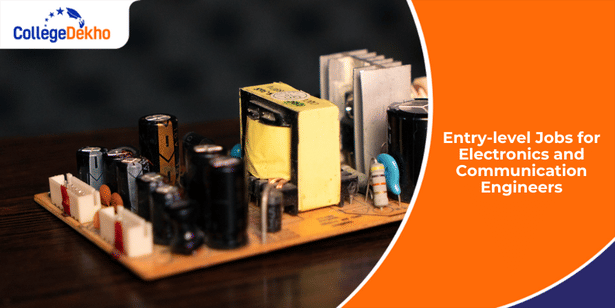
Your degree in Electronics and Communication Engineering has just opened a world of fantastic opportunities. ECE graduates make technology for everyday use, from designing chips that power smartphones to building networks that connect millions. By now, you might just want to know which job is suitable for you or the salary to expect as a fresher. One good thing? Companies in India are actively hunting for young and talented ECE graduates like you!
Entry-Level Jobs for Electronics and Communication Engineers
Check here the entry-level jobs for electronics and communication engineers with the average annual salary and companies that are typically hiring:
Job Role | Average Salary (INR) | Typical Hiring Companies |
|---|---|---|
Embedded Systems Engineer | ₹6.7 LPA | Wipro, Infosys, Bosch, Be Connected |
VLSI Design Engineer | ₹15.2 LPA | Intel, Qualcomm, Broadcom, AMD |
Telecom Engineer | ₹7.5 LPA | Airtel, Jio, Vodafone Idea, BSNL |
RF Engineer | ₹4.5 LPA | Qualcomm, Ericsson, Nokia, Huawei |
Network Engineer | ₹6 LPA | Cisco, Juniper Networks, Tata Communications, Airtel |
Test Engineer | ₹5.7 LPA | Siemens, Honeywell, Medtronic, Capgemini |
PCB Design Engineer | ₹2–4 LPA | TronicsZone, Zetamp Energy Solutions |
Automation Engineer (PLC) | ₹3–4 LPA | SIEBENER Automation, Siemens, Schneider Electric |
Hardware Engineer | ₹4–10 LPA | Capgemini Engineering, BHEL, Syniverse |
AI/ML Engineer | ₹2.3–8 LPA | Lincode, Syniverse |
Popular ECE Careers and Their Roles for Beginners
So we have an idea of what these roles are for ECE, let's understand what you actually need to do in these jobs:
Job Role | Job Description |
|---|---|
Embedded Systems Engineer | Develop small computer systems built into devices. Work with microcontrollers and sensors to make devices smarter and efficient. |
VLSI Design Engineer | Design and test integrated circuits for electronic devices. Focus on chip layout, performance, and reliability. |
Telecom Engineer | Maintain and improve communication networks. Handle mobile towers, optical fibers, and wireless systems for smooth data and voice services. |
RF Engineer | Design and test radio frequency systems for wireless communication. Work on antennas, signal transmission, and device connectivity. |
Network Engineer | Set up and manage computer networks. Configure routers, switches, and security protocols to ensure stable and fast communication. |
Test Engineer | Check electronic products and systems for errors. Identify issues, run tests, and report for improvements. |
PCB Design Engineer | Design printed circuit boards for electronic devices. Ensure all components are correctly placed and connected. |
Automation Engineer (PLC) | Program and maintain factory machines using PLCs. Ensure machines operate automatically and efficiently. |
Hardware Engineer | Build and maintain computer and electronic hardware. Work on processors, memory, and boards to make systems reliable. |
AI/ML Engineer | Apply artificial intelligence and machine learning to electronic systems. Analyze data and improve smart device performance. |
Skills Required for Entry-Level ECE Jobs
There are certain skills that are very important to get an entry-level ECE job. Let's understand some of those top skills:
Job Role | Skills Needed |
|---|---|
Embedded Systems Engineer | Knowledge of microcontrollers, C/C++ programming, understanding of sensors and IoT, debugging and firmware development, problem-solving. |
VLSI Design Engineer | Circuit design, HDL programming (Verilog/VHDL), simulation and testing, attention to detail, understanding digital and analog electronics. |
Telecom Engineer | Understanding of mobile networks and protocols, signal processing, networking basics, troubleshooting, communication and analytical skills. |
RF Engineer | Antenna design basics, signal analysis, wireless communication principles, problem-solving, working with test equipment. |
Network Engineer | Networking protocols (TCP/IP), configuring routers/switches, network troubleshooting, cybersecurity awareness, logical thinking. |
Test Engineer | Knowledge of testing methods, debugging circuits, attention to detail, documentation skills, analytical thinking. |
PCB Design Engineer | PCB layout tools (Altium, Eagle), understanding of electronics components, circuit schematics, design optimization, precision. |
Automation Engineer (PLC) | PLC programming, understanding industrial machines, sensors and actuators, automation logic design, problem-solving. |
Hardware Engineer | Knowledge of processors and memory, circuit design, electronics troubleshooting, hands-on assembly/testing, technical problem-solving. |
AI/ML Engineer | Basics of AI/ML algorithms, data analysis, programming (Python/Matlab), integrating smart systems with hardware, logical thinking. |
The prospects seem quite promising for ECE graduates, considering many career alternatives. Choose an option that intrigues you, build your proficiency, and keep an open mind toward learning emerging technologies.

















Similar Articles
Most Important Chapters for GUJCET 2026 Mathematics Revision
High Weightage Chemistry Chapters for GUJCET 2026 Preparation
Master GUJCET 2026 Physics: High Weightage Chapters & Strategy
Private Engineering Colleges Accepting JEE Main Score 2026
60+ Percentile in JEE Main 2026 Predictions and Expectations
JEE Mains 2026 Login (Open), Application Number and Password - Steps to Retrieve